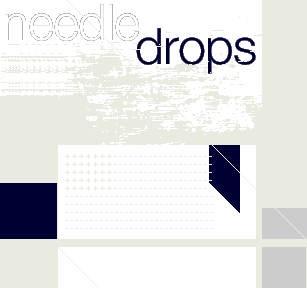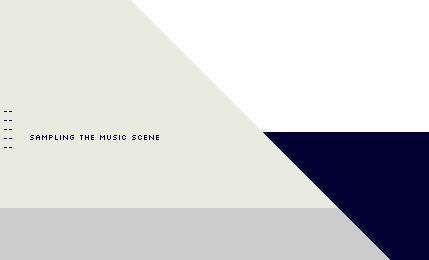


++ Contact Philip Sherburne ++
++ Recently ++
Tuesday, November 29, 2005 = The Stooges Unearthed (Again)
Tuesday, November 8, 2005 = Documenting Beulah And DCFC
Tuesday, November 1, 2005 = Out-Of-Control Rock 'N' Roll Is Alive And Well
Tuesday, October 25, 2005 = Just In Time For Halloween
Monday, October 3, 2005 = The Dandyesque Raunch Of Louis XI
Monday, August 15, 2005 = The Empire Blues
Tuesday, August 9, 2005 = David Howie's Sónar Diary
Monday, July 25, 2005 = Hot Sounds For Summertime
Monday, June 27, 2005 = Overcoming Writer's Block At Sónar 2005
Monday, June 4, 2005 = Cool New Sounds To Download Or Stream
++ Needle Drops Archives ++
View full list of Needle Drops articles...
|
|
 |
September 21, 2001
++ Does Electronic Music Matter Anymore?
++ Last week I thought I was stepping out on some kind of limb, trying to wrap an electronic music column around the pulverized matter of the World Trade Center disaster. Judging by the response from readers, that clearly wasn't the case — or if it was, we're all bobbing on the bough together, teetering in the balance between the gravity of the moment and the lightness of entertainment. As one reader wrote to me, "Oddly enough, as the events of this past week transpired, I discovered on Friday that I had ceased listening to music altogether. I couldn't quite put my finger on why, vaguely feeling that it had something to do with the music being inherently meaningless in relation to the news of the day."
The Frankfurt School philosopher Theodor Adorno is often cited as saying that there can be no poetry after Auschwitz. That quotation has haunted me since last week's tragedy, as I've pondered the relevance of electronic music and tried to revive my own enthusiasm for the subject. In fact, the full text of his statement reads, "to write poetry after Auschwitz is barbaric" (Prisms, MIT Press, 1981, p.34). True to Adorno's method, there's no neat resolution to his almost maddeningly blunt statement, which is precisely why it resonates so; it haunts us because it needles straight to the core of our doubts.
But it's worth linking his assessment with a later amendment, where he wrote, "I have no wish to soften the saying that to write lyric poetry after Auschwitz is barbaric...[But] literature must resist this verdict... It is now virtually in art alone that suffering can still find its own voice, consolation, without immediately being betrayed by it" (quoted in Eric L. Santner's "History Beyond the Pleasure Principle: Some Thoughts on the Representation of Trauma," Probing the Limits of Representation, ed. Saul Friedlander; Harvard University Press, 1992, p.144).
The lesson? There is no lesson; that's one of the beauties of Adorno's dialectical thought (and if you're interested in exploring it further, I wholeheartedly recommend checking out his collection of essays, fragments and aphorisms, Minima Moralia); but it is worth bearing in mind as we contemplate the ends of art, entertainment, and of our own efforts, in the present crisis. (I also stand behind my colleagues at XLR8R when they say that "dancing can be a political act.")
Interestingly, as Seth Mnookin's article in Tuesday's issue of Inside shows, many, many publications usually devoted to entertainment, celebrity and frivolity have suddenly turned serious. Vanity Fair editor Graydon Carter is quoted as saying, "There's going to be a seismic change. I think it's the end of the age of irony." As much as that statement heartens me, I'm deeply suspicious of such a sudden turn in pop culture; a 180 like that seems as indicative of our cultural amnesia, our collective aversion to history, as the fluff pieces that preceded it. My point? Be skeptical. Check the sources of what you read. Check their sources. Above all, read.
In addition to my usual news fare (the New York Times, CNN online), I've been reading press both far to the left and to the right, to get a sense of the currents of popular opinion. And you know what? Deciding the right course to take is going to be an uphill battle. On my lunch break today, I visited Borders Books and Music — not my favorite bookmonger, but the closest option where I work in Emeryville, Calif. — to look for books on the Middle East. Three pathetic shelves sat there, laden with Orientalist fantasies, a few Oprah selections and a slim handful of worthwhile specimens. A slim handful. Borders, of course, caters to the market demand. And if the demand for books on the Middle East is so weak — indicating that John Q. Public doesn't really know, or care to know, what's going on across the globe — is it any surprise we've found ourselves in this mess?
Fortunately, I chanced upon Blaming the Victim: Spurious Scholarship and the Palestinian Question by Edward Said and Christopher Hitchens (Verso 1988). It's not the be-all and end-all of Middle East scholarship, but it's a worthwhile tool in the process of forming your own assessment of the current crisis. In an article entitled "The Essential Terrorist" — even more relevant now than when it was written more than a decade ago — Said writes:
"Past and future bombing raids aside, the terrorism craze is dangerous because it consolidates the immense, unrestrained pseudopatriotic narcissism we are nourishing. Is there no limit to the folly that convinces large numbers of Americans that it is now unsafe to travel, and at the same time blinds them to all the pain and violence that so many people in Africa, Asia and Latin America must endure simply because we have decided that local oppressors, whom we call freedom fighters, can go on with their killing in the name of anticommunism and antiterrorism? Is there no way to participate in politics beyond the repetition of prefabricated slogans? What happened to the precision, discrimination and critical humanism that we celebrate as the hallmarks of liberal education and the Western heritage?
"Do not try to answer those questions straight out. Instead, get hold of any treatise, article, television transcript, editorial, public proclamation or book on terrorism... and ask the author questions you would ask someone who argued that the universe was being run from an office inside the Great Pyramid. The world's, and our, problems will not disappear at all: they'll become fully apparent as now, under the sign of terrorism, they are not. The main task for American intellectuals is not to attack Libya or denounce Soviet communism, but to figure out how this country's staggering power can be harnessed for communal coexistence with other societies rather than for violence against them" (p. 158).
This should not be an onerous task. More than once I've heard someone refer to the present moment as "an opportunity." What that opportunity may entail, I submit to your consideration. But make no mistake: this is a critical moment. For those of my generation, born at the end of the Vietnam war or after, it may be the gravest geopolitical challenge we have faced — and thus our greatest opportunity, as a nation (and a world) coming to terms with a new balance, after the era of superpowers has passed. As my good friend Monty Luke would say, "Believe."
++ For two weeks now, I've taken a break from the confines of electronic music in order to address some of the weightier issues at hand. But make no mistake, the beat goes on: next week, the Needle Drops squarely on the one, with profiles of new releases from Force Inc., Kitty-Yo, Tigerbeat6 and more.
|
| |
|